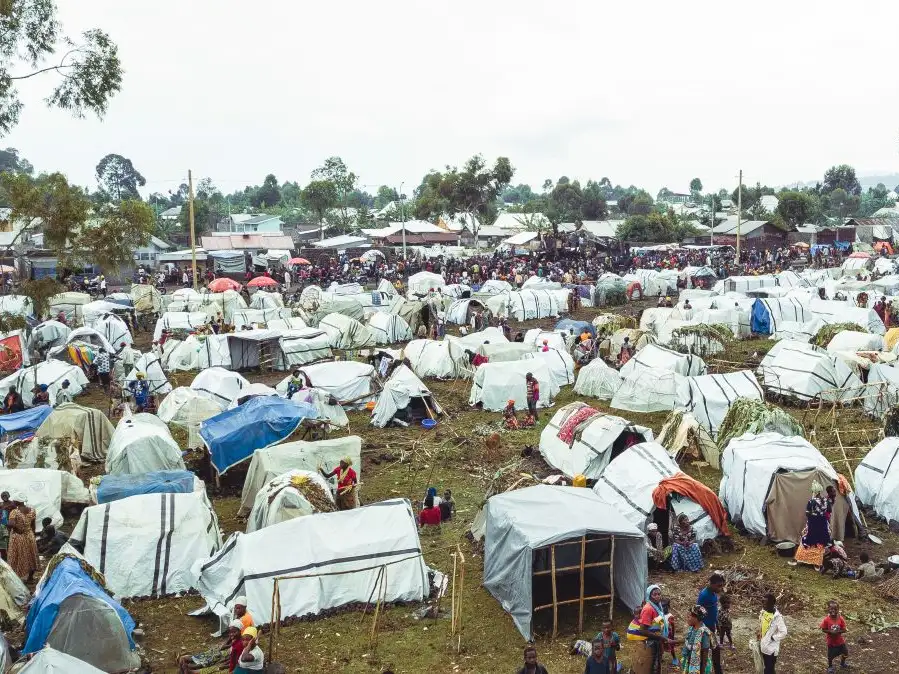Donate to the Refugee and Conflict Fund
Your donations will help reach vulnerable people fleeing war, poverty and natural disasters.


When conflict between Congolese troops and M23 rebels escalated in 2022, hundreds of thousands of people were estimated to have fled their homes. (Photo taken March 2023)
Fighting in the Democratic Republic of the Congo (DRC) has impacted the lives of many civilians and has internally displaced millions of families. Recent fighting between government forces and the M23 rebel group, which culminated on 27 January with the M23 rebels gaining control of Goma, provincial capital, has caused a major humanitarian crisis.
While the fighting has subsided in Goma, hundreds of thousands of people are now in dire need of humanitarian aid. UN aid agencies are warning of a major humanitarian crisis as displaced families are cut off from food, medical care and safe water.
Decades of fighting between the Congolese government and rebel groups have seen millions of people killed due to conflict, hunger and disease, and millions more displaced from their homes and forced away from their livelihoods. Many had fled conflict zones into Goma, a major city in DRC, seeking safety.
But on 26 January, violence followed them into the city. At nightfall, the M23 rebel group (one of the groups fighting the Congolese government) fought their way into the city. Fighting broke out in parts of the city and by 27 January the M23 rebel group were declaring the city – home to around 2 million people - under their control.
Since then, the situation in Goma has somewhat stabilised but communities are now counting the cost – The UN has reported more than 3000 dead and hospitals overflowing with wounded people.
“CAFOD staff remained in Goma throughout the recent escalation, and we are currently one of only a few organisations able to provide humanitarian support inside the city. We are continuing to offer assistance and support to vulnerable people caught up in the chaos.”
The humanitarian needs are vast. Hundreds of thousands of people are displaced from their homes and are in urgent need of help with little to no access to safe water, food and essential items like blankets. With lack of these basics, the cholera-prone region could experience a severe outbreak causing further suffering to displaced civilians.
Although fighting has subsided, violence against civilians, aid workers and children persists. There have been attacks on civilian buildings and areas where humanitarian agencies are working. This has contributed to banks, schools and businesses remaining closed affecting all people in Goma. CAFOD is calling for respect of International Humanitarian Law to protect civilians and aid workers in Goma.
CAFOD is working closely with a local female led organisation to support displaced people. Local Catholic women held a conference on February 4, 2025, to announce their commitment to provide emergency aid with CAFOD.
A better world needs all of us and we are seeing this in action. With donations from people like you, the local women are providing essential humanitarian aid and shelter. They are identifying host families in parishes for displaced people to stay. We are there with them, providing food assistance (like beans, rice and flour), hygiene products (like soap and children’s diapers) and psychological support to people who have suffered catastrophic trauma from conflict.
Bernard Balibuno, CAFOD’s Country Representative in DRC, said, “CAFOD staff remained in Goma throughout the recent escalation, and we are currently one of only a few organisations able to provide humanitarian support inside the city.
"We are continuing to offer assistance and support to vulnerable people caught up in the chaos.
“We urge all those in positions of influence, as well as in DRC and the wider region, to support viable efforts towards peaceful negotiations, and work to bring an end to the suffering of so many, to protect civilians, and prevent any further increase in the fighting.”
CAFOD is calling for the international community to encourage all groups in the conflict to allow the delivery of life-saving humanitarian aid to civilians. This includes reopening the airport in Goma to allow essential resources like food and medicines to be delivered to families trapped in the city.
We are making sure DRC is not a forgotten crisis, and you can do the same.
Given the humanitarian situation facing the people of Goma, we need to talk about the conflict more than ever. It takes all of us working together to support families experiencing this humanitarian crisis. You can share this article with friends, family and your parish, and talk about the crisis that’s happening in Goma right now.
We invite you to keep our sisters and brothers in Goma in your thoughts and prayers.
Thanks to our brilliant local experts and the support of the Catholic community in England and Wales, we are ready to respond to this growing need as families are displaced once again.
Your donations will help reach vulnerable people fleeing war, poverty and natural disasters.
Pray for the gift of peace for all those facing conflict.